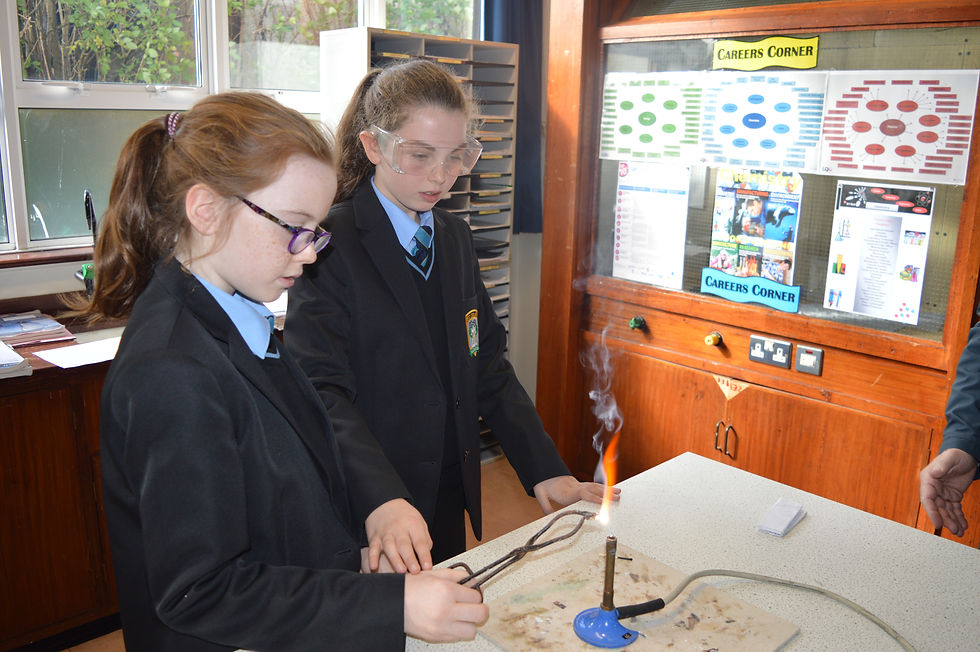Tel: 028 79628377 Fax: 028 79628973


Science
Introduction
The Science Department is committed to developing an understanding and knowledge of the world of science whilst encouraging an interest and enthusiasm for the subject.
At Key Stage 3 we follow a broad and balanced curriculum, focusing on developing practical skills as well as knowledge and application, designed to meet the needs of each pupil's level of ability. We address many relevant themes with reference to Health Education, Careers, Environmental Awareness, Literacy, Numeracy and ICT.
At Key Stage 4 we offer either GCSE Double or Single Award at both Higher and Foundation Tier. Both courses include elements of Biology, Chemistry and Physics.




KS3 Subject Overview
Term 1
Year 8
-
Myself as a scientist
-
Investigating Science
-
Caring for our world
Year 9
-
Env & Populations
-
Electricity & Magnetism
-
Matter / Water explorers
Year 10
-
Forces & Using forces
-
Staying Alive
-
Chemical Reactions
Term 2
Year 8
-
Energy & Carbon footprint
-
Growing Up
Year 9
-
Food & Digestion
-
Sight & Sound
Year 10
-
Earth & Space
-
Plants at Work
Term 3
Year 8
-
Acids & Alkalis
-
Variety of Life
Year 9
-
Elements
-
Data Handling
Year 10
-
Ethical Issues in Sc
-
KS4 Preparation
Exam Board: CCEA
SA Science:
Through studying this specification, students:
-
gain a broad knowledge and understanding of the material, physical and living worlds;
-
develop an understanding of the importance of scale in science;
-
develop and apply their knowledge and understanding of the scientific process through hypotheses, theories and concepts;
-
develop their understanding of the relationships between hypotheses, evidence, theories and explanations;
-
develop awareness of risk and the ability to assess potential risk;
-
develop and apply their observational, practical, enquiry and problem-solving skills and understanding in laboratory, field and other learning environments;
-
develop skills in communication, mathematics and the use of technology in scientific contexts;
-
acquire and apply skills, knowledge and understanding of how science works and its essential role in society.

DA Science:
Through studying this specification, students:
-
gain a broad knowledge and understanding of science, biology, chemistry and physics;
-
gain scientific, investigation and problem-solving skills;
-
develop a critical approach to scientific evidence and methods; and
-
acquire and apply skills, knowledge and understanding of how science works and its essential role in society.
This specification offers pupils the opportunity to be inspired, motivated and challenged in a broad, practical and worthwhile course; encouraging them to develop curiosity about the living, material and physical worlds and provides insights and experience of how science works.
This course prepares pupils to study science-related subjects at a more advanced level, for example A Level Physics, Chemistry and Biology. For those progressing directly into employment, a GCSE in DA Science is relevant to the fields of science and engineering, and also to areas of commerce and public service that value problem-solving and practical skills.

AS/A2 Subject Overview: Biology
Exam Board: CCEA

Career Opportunities
Following a Double Award Science course:
DA Science provides the basis for the study of science related courses at A Level.
This can then lead to careers in the following fields:
Medicine, agriculture, engineering, architecture, physiotherapy, pharmacy, nursing, sports science, forensics, nutrition, veterinary science, dentistry.
Following a Double Award Science course:
Single Award Science provides a basic background in Science and therefore is sufficient for jobs which require minimal science or GCE A Levels not requiring Double Award Science.
